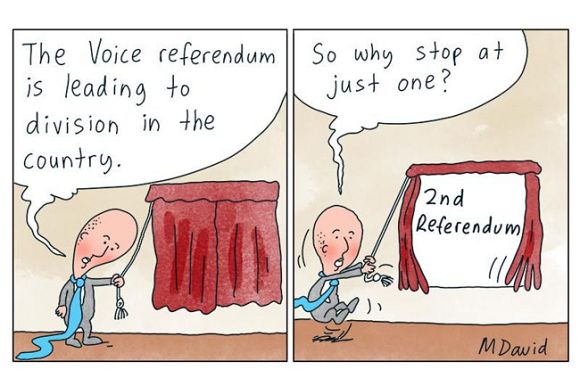The last push for the “Yes” campaign can turn around the polling if it changes its tactics, writes Alexandra Snow.
WITH JUST DAYS remaining until the Voice Referendum, the “Yes” campaign still has the opportunity to reverse the current trend. While recent polling has shown a modest resurgence in support for the “Yes” vote, it continues to lag behind overall. As the vote deadline approaches, the outlook may seem less than favourable for the “Yes” campaign.
The final week of campaigning has witnessed efforts by Prime Minister Anthony Albanese to personally engage with voters, aiming to bolster further support. However, there are potential strategies that could inject some last-minute momentum into the “Yes” vote.
While the “No” campaign emphasises the notion that the Indigenous Voice to Parliament would exacerbate division, recent polling conducted by The Conversation paints a different picture. It reveals that “No” voters are more likely to perceive Australia as already divided. “Yes” voters tend to see the country as more united.
Among those who view the nation as unified, a substantial 58% intend to vote “Yes” while only 34% plan to vote “No”. Conversely, those who perceive division are almost diametrically opposed, with 59% leaning towards a “No” vote and only 34% supporting “Yes”. This stark contrast contradicts the “No” campaign's argument that the Voice represents a “voice of division”.
To secure a turnaround in the polls and victory in this generational Referendum, the “Yes” campaign must make a concerted effort to target those who believe the country is already divided and win over their votes.
The “No” campaign, in contrast, is not focusing on Australians who seek to prevent division but rather on those who already perceive division. Instead of serving as a platform for “unity” as it claims, the “No” campaign appears to be amplifying division.
The polling data highlights variations in perceptions of unity among different demographics, with retirees and older voters more inclined to see division, making them more likely to support the “No” vote.
To bridge this gap, the “Yes” campaign should leverage this data to tailor its messaging to older voters. However, this outreach should extend beyond social media or placards outside polling stations; it should include targeted grassroots campaigns aimed at the retiree demographic. The message should emphasise that a “Yes” vote signifies a step towards unity, while a “No” vote may deepen the division they already perceive.
By effectively targeting those who believe the country is divided and demonstrating Australia's potential for unity, the “Yes” campaign may have the opportunity to swing the result back in its favour as the vote draws near.
Alexandra Snow is a Politics and International Relations graduate from the University of Warwick (UK), with a focus on UK and Australian politics.
Related Articles
- Voice Referendum: What you should do if you don't know
- Atlas Network's fossil-fuelled campaign against the Voice
- Referendum’s clear choices on the way Australia should go
- Both major party leaders damaged by Voice Referendum
- Scare campaigns built on lies not policed by the media
 This work is licensed under a Creative Commons Attribution-NonCommercial-NoDerivs 3.0 Australia License
This work is licensed under a Creative Commons Attribution-NonCommercial-NoDerivs 3.0 Australia License
Support independent journalism Subscribe to IA.













